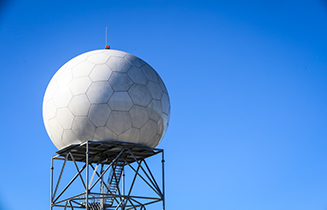Published April 15, 2020
On Easter Sunday, in the midst of the COVID-19 crisis, an EF-3 tornado with winds
of about 140 mph struck the Monroe/West Monroe area causing destruction around Northeastern
Louisiana. There were also two tornadoes that struck the Sterlington area, an EF-2
and EF-1.
The National Weather Service (NWS) in Shreveport credits the University of Louisiana
Monroe Doppler radar with providing critical data which led to additional lead-time
on alerts and alarms to warn the residents of Monroe and West Monroe and the surrounding
area about the tornados.
Todd Murphy, Ph.D., Assistant Professor in Atmospheric Science was in communication
with the NWS throughout the entire severe weather event ensuring the radar was scanning
in a manner that helped their operations.
The NWS Shreveport issued the first tornado warning that included Monroe at 11:33
a.m. on Sunday, April 12 based on a radar detected surge in the line of thunderstorms.
One minute later the rotation increased on the ULM radar, and a “tornadic debris signature”
was detected on the ULM radar at 11:36 a.m.
Just a few minutes later the tornado touched down in the Brownsville - Bawcomville
community and moved to the City of West Monroe damaging many homes. It then crossed
the Ouachita River onto South Grand Street and impacted neighborhoods as well as the
Masur Museum of Art.
It crossed near the intersection of Highway 165 and I-20 damaging structures and wooden
power poles as it continued north of Millhaven Road then on to the Monroe airport
causing severe damage at the airport and nearby neighborhoods.
Because of the additional lead-time for alerts and alarms to warn members of the Northeast
Louisiana community to seek shelter, the ULM Doppler radar played a crucial role in
the detection of the Monroe tornado and likely saved lives on Sunday.
“The ULM Doppler weather radar was built specifically to close a low-level data gap
within the national radar network, and it has time and again provided invaluable data
to the National Weather Service to assist in the issuance of local severe weather
warnings. We work closely with NWS meteorologist to ensure they receive timely and
accurate data from our radar. In addition to this great service, the radar is used
both in research and teaching, providing students a unique hands-on learning experience
only available at some of the top atmospheric science programs in the country,” stated
Murphy.
Less than a year ago, ULM Doppler radar was credited for helping save lives with advance detection of the tornado which struck
Ruston on April 25, 2019.
ULM installed the Doppler radar in October 2016 using a $3 million grant provided
by the Louisiana Governor’s Office of Homeland Security and Emergency Preparedness
(GOHSEP). ULM is the only primarily undergraduate institution in the United States
with a S-band polarmetric Doppler weather radar. ULM students receive hands-on instruction
at the undergraduate level on radar operation, in addition to advanced radar analysis
and interpretation techniques.

